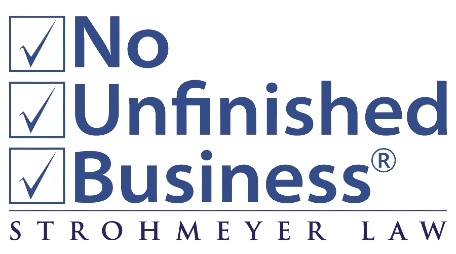Why You Need a Trademark
No Unfinished Business Podcast Ep. 33: Why You Need a Trademark w. Jim Hart
We’ll explain the the four main areas of intellectual property for business owners, why trademarks are crucial, and how to get your marks registered.
Introduction
Intellectual Property (IP) often gets the short shrift when it comes to business considerations, particularly for entrepreneurs. John sits down with Jim Hart, a seasoned trademark attorney, on the No Unfinished Business Podcast to shed light on this crucial topic. In this blog post, we unpack the essential elements of the conversation, ranging from the four types of intellectual property to the step-by-step guide on registering a trademark.
The Four Types of Intellectual Property: A Quick Primer
Before diving into the nitty-gritty, Jim outlined the four main types of intellectual property: patents, trade secrets, trademarks, and copyrights. This part is especially crucial for those unfamiliar with the legal jargon.
- Patents: These protect inventions and require registration with the Patent and Trademark Office (USPTO).
- Trade Secrets: These are confidential pieces of information that give a business a competitive edge. They’re protected through contracts, such as non-disclosure agreements, and need not be registered.
- Trademarks: These are signs or symbols representing a business, also registered through the USPTO.
- Copyrights: These protect original works of authorship and are registered through the US Copyright Office.
Missteps Entrepreneurs Make with Intellectual Property
Jim points out that entrepreneurs often neglect intellectual property matters. Many assume that a name’s availability in the USPTO database means it’s up for grabs, without considering “likelihood of confusion,” a legal standard in trademark law. This standard implies that if your business name or mark is too similar to an existing one in a related field, it could be rejected, potentially wasting time and resources.
Steps to Registering a Trademark
According to Jim, the process involves eight distinct steps:
- Comprehensive Search: To ensure no one else is using your desired name.
- Determine Ownership: Decide who will own the trademark.
- Class of Goods and Service: Develop descriptions for each class that your business falls into.
- Filing Basis: Determine your basis for filing.
- Application: File the trademark application on the USPTO website.
- Office Actions: Respond to any actions from the trademark office.
- Publication Process: Your trademark will be published for opposition.
- Final Registration: If unopposed, your trademark will be registered.
Jim also emphasized the need for caution throughout the process. Mistakes at any stage could lead to delays or denials, not to mention legal repercussions.
Why Advisors Should Care
If you’re an advisor, accountant, or even another attorney, Jim suggests that you should be vigilant about your clients’ intellectual property. Advisors have a responsibility to alert clients who are unaware or neglectful of their IP, as this oversight could land them in legal hot water. This situation could have a ripple effect, harming not only the client but also affecting your relationship with them.
Closing Thoughts
Intellectual property may seem like a complicated field, but its importance can’t be overstated, especially for small businesses and entrepreneurs.
Follow Jim on YouTube at https://www.youtube.com/@jimhart or at https://www.hawthornlaw.net/
No Unfinished Business® Podcast
We hope you’ll join us each week, so hit that follow button, and if you have any questions, feedback, or ideas for topics, please reach out via social or email. We’d love to hear from you.
Contact John at john@strohmeyerlaw.com or via social.
Visit https://www.strohmeyerlaw.com/houston-professional-advisors for more info about how John works with professional advisors.
Schedule a free consultation with Strohmeyer Law to protect your family with an estate plan.
End-of-Year Strategies for Irrevocable Gifting Trusts
As the year draws to a close, there are some crucial actions to take with an irrevocable gifting trust.
What to Do If You Receive an IRS Letter
Receiving a letter from the IRS might send shivers down your spine. So what's your first step? Is it always a cause for alarm? Let's walk through what you should do.
Why You Need a Trademark
We'll explain the the four main areas of intellectual property for business owners, why trademarks are crucial, and how to get your marks registered.




